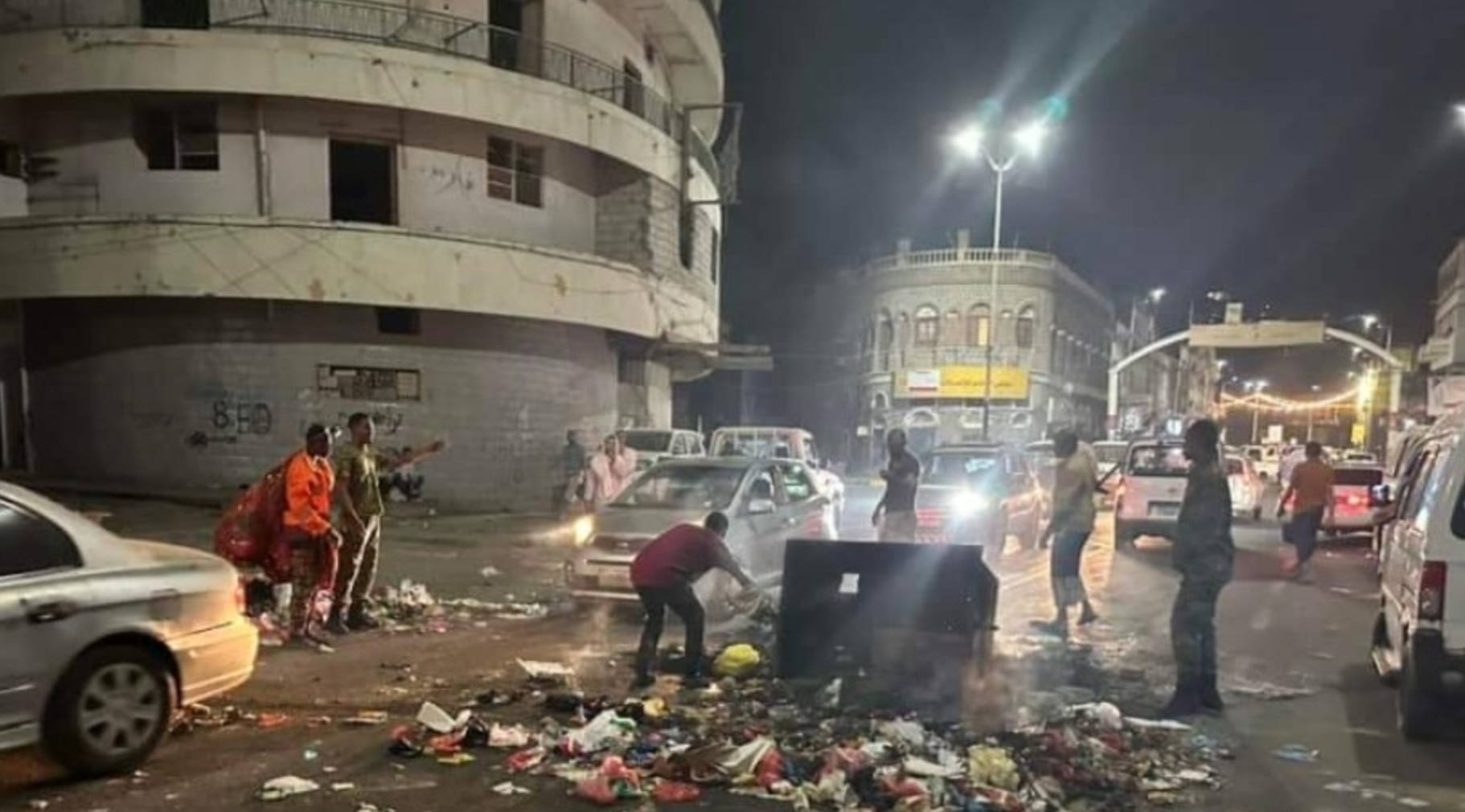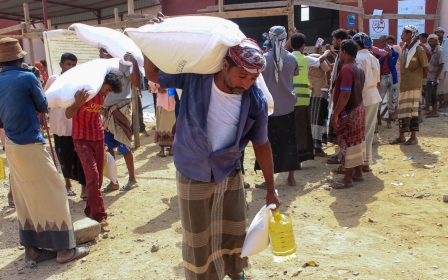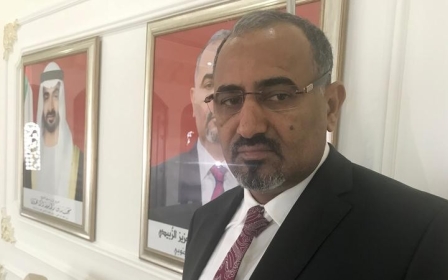Yemen: Anger mounts in Aden as temperatures and power outages soar

As the summer heat scorches Yemen, authorities in the coastal city of Aden are cracking down on demonstrators protesting against the dire economic situation and near-constant power outages.
With temperatures reaching record highs across Europe and the Middle East as climate change accelerates, reliable electricity supplies are needed to run fans and air conditioning units, with people seeking some relief from the heat.
Aden is currently recording temperatures in the mid-30s, with the thermometer sometimes reaching 40C. But residents in the city can only rely on six hours of electricity supply every 24 hours.
The largest port in Yemen, Aden is currently under the control of the Saudi-backed internationally recognised government (IRG) and the Southern Transitional Council (STC), a separatist group that demands independence for the country's south.
The STC's leader, Brigadier Aidarous al-Zubaidi, is a member of the Presidential Leadership Council, the government's executive body which was established in Riyadh in April 2022.
New MEE newsletter: Jerusalem Dispatch
Sign up to get the latest insights and analysis on Israel-Palestine, alongside Turkey Unpacked and other MEE newsletters
In addition to the electricity outages, the Yemeni rial has been collapsing in value over the last 10 days in government-controlled areas. The rial has fallen from YR1,250 to YR1,500 against the US dollar.
While Aden's citizens used to go to protests supporting one political side or another, the breakdown of power supplies and the currency collapse have led to widespread protests that simply target the government's handling of the economic crisis.
Mazen Abdulbari, 39, told Middle East Eye that he and other residents were out on the streets protesting poor living conditions. He said they wanted the world to know about their suffering, but that it seemed their voices were not being heard.
'The hot weather is killing us, our homes are almost empty of basic necessities and prices are rising every day. Why wouldn't we protest?'
- Mazen Abdulbari, Aden resident
"My children cry all night long because they can't sleep in the hot weather with no electricity. It's a shame that the government hasn't solved this problem for years," Abdulbari said.
The Yemeni father added that the dramatic increase in prices has made the situation even worse. He said that everything has become expensive and his income as a bus driver is no longer enough to support his family.
"We live in a coastal area but we can't afford to buy fish. We only eat meat during Eid," he told MEE.
Asked why he and other protesters went onto the streets and blocked roads, Abdulbari replied: "The question shouldn't be why we're protesting. The hot weather is killing us, our homes are almost empty of basic necessities and prices are rising every day. Why wouldn't we protest?"
Thousands of people have participated in the protests in Aden, he said. They are demanding better living conditions and have not mentioned any particular political party.
"The protests have brought together supporters of different political parties. They chant against the authorities in Aden and demand electricity and a better life," Abdulbari said.
'A dignified life'
Protests have run across several streets in the city of Aden, with police intervening to suppress them and prevent further demonstrations. Protesters have also been arrested.
Ahmed Dahmashi, a resident of Aden who works as a pharmacist, told MEE: "Before the war erupted in Aden in 2015, we used to protest for secondary demands, such as paying bonuses to public employees or other similar issues. The authorities did not suppress us then.
"Moreover, during the last few years, supporters of conflicting parties have gone onto the streets to chant against one side or praise another, and sometimes they have chanted for other countries. These protests were not suppressed either."
Now, Dahmashi said, things have changed. The freedom to protest is no longer there and authorities are now using force to crack down on demonstrations.
"Some protesters were arrested under the pretext of disturbing security, and this created real terror among the protesters, so we returned home,” Dahmashi added.
"Our goal was not to disturb security, but to send a message to the authorities and help solve the problem. But that was not possible, and all we got was terror from the arrest of protesters."
No protest is planned this week, he said, but this also depends on the situation on the ground. If the electricity supply gets worse and prices continue to rise, they may head back out onto the streets.
"The government ignores our suffering. I call on the United Nations and the international community to pressure the government to solve the electricity outages and stop the collapse of the currency," Dahmashi said.
"All we need is a dignified life. We don't want to see our children suffer with hot weather and a lack of basic services."
Similar protests have taken place in other parts of Yemen. In Hadhramaut province, demonstrations were met with no response from the government.
Two-thirds of the population of Yemen - 21.6 million people - need humanitarian assistance and protection services, according to the UN Office for the Coordination of Humanitarian Affairs.
Deepening economic crisis
Aden is safer now than it has been in the past seven years, which were wracked by war.
But like other areas under government control, it is experiencing the worst economic crisis in the country's history. This is largely because Yemen stopped exporting oil after Houthi attacks on oil ports.
'This is the first time that Yemen has completely stopped exporting oil, which forms the main resource for the country'
- Ahmed Abdulwadood, economist
The Houthis warned oil and shipping companies to cease production. After the six-month-long UN-mediated truce of 2022 ended on 2 October, the Iran-aligned group began attacks on an export terminal in the Arabian Sea, in the east of the country, forcing an oil tanker to leave the site as it docked.
Before the outbreak of the war, oil production in Yemen accounted for 70 percent of the country's general budget resources. But no oil has been exported since the Houthi attacks.
Ahmed Abdulwadood, an economic expert who has worked in Yemeni banks, told MEE: "This is the first time that Yemen has completely stopped exporting oil, which forms the main resource for the country. The collapse of the currency and the current economic crisis are just an impact of that."
He said that purchasing enough fuel for electricity in Aden and maintaining the electricity stations cost a lot of money. Because the government cannot afford to cover these costs, people do not have 24-hour electricity.
"If Yemen does not resume exporting oil, the coming months will be worse," Abdulwadood said.
Middle East Eye delivers independent and unrivalled coverage and analysis of the Middle East, North Africa and beyond. To learn more about republishing this content and the associated fees, please fill out this form. More about MEE can be found here.





